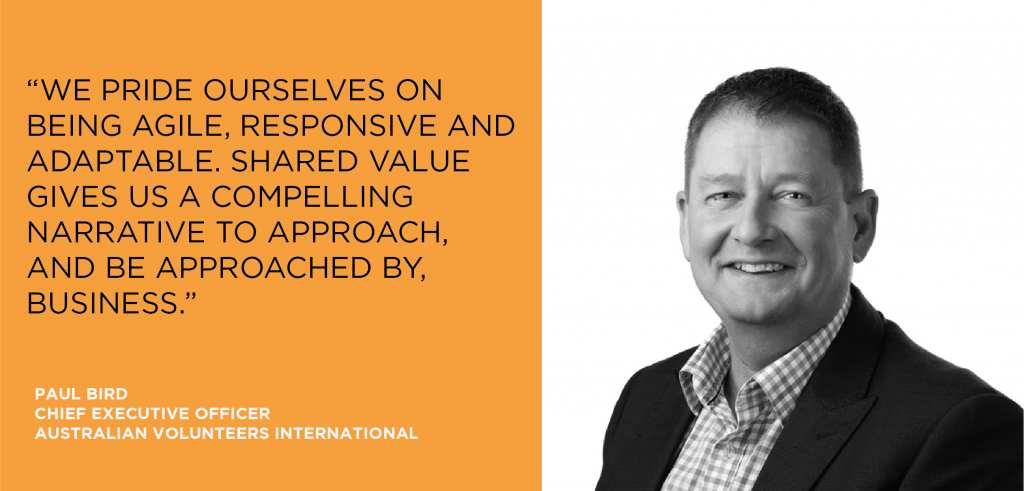Prior to his current role, Paul Bird, Chief Executive Officer at AVI, was running KPMG in West Africa. How has his background in business helped in developing a community of volunteers passionate in advancing the shared value movement? Read on to find out.
What does shared value mean to you?
As Jeffrey Sachs notes, ‘there are no solutions to the problems of poverty, population and environment without the engagement of the private sector’. Shared value provides a new and welcome recognition and basis to identify and deliver business wins through collaborative and long term partnerships needed to address the social and environmental challenges of our time. As it is open about, demonstrates and celebrates, the benefits to business, it makes business sense and has the potential to be embedded in core business, scalable and sustainable.
What lead you individually to the shared value idea? How did you come across it?
I come from business, having run KPMG in West Africa and worked in Europe and the UK, before returning to Melbourne, and am passionate about creating business models to harness their goods, services, staff and customers to grow their reputation, revenue and customers through economic and social development. In Australia, I’ve had the privilege of working with Telstra, Accor, JetStar and Spotlight and have established five social enterprises.
What does shared value success look like at AVI and where are you at on the journey?
A billion people have been lifted out of extreme poverty over the last decade through economic and human development. The growth and adaptation of business has been key, with multinationals such as Unilever leading the way. As a 66 year old, for-purpose company, AVI has a proud history of working in 89 developing countries to build relationships and share skills and knowledge to build the capacity of business, government and civil society to achieve their own goals. We pride ourselves on being agile, responsive and adaptable. Shared value gives us a compelling narrative to approach, and be approached by, business.
What is your role individually within AVI to support the company along its shared value journey?
I’ve learnt that partnerships are personal, and that lasting and impactful relationships are built on mutual respect and trust. I enjoy enabling and working in a culture and environment at AVI where our team are encouraged to see and develop shared value opportunities and execute to the highest standards. It is also important for me to ensure monitoring and evaluation are built into shared value initiatives from the start to be able to demonstrate and celebrate the outcomes regularly, including assessing the partnership itself.
Tell us more about your partnership with The Intrepid Group to promote inclusive growth and responsible tourism within the tourism industry in Myanmar. How is shared value helping to achieve this aim?
As the world’s largest adventure travel company, sending over 250,000 travellers overseas each year, The Intrepid Group’s vision to ‘change the way people see the world’ and its ethical values base closely aligns to AVI. Their business is built on sustainable, experience rich travel (SERT) for small groups and must constantly find new SERT products to compete in a global market. At the same time, AVI supports the development of small business in developing countries as crucial to their economic growth and escape from poverty.
With its recent democratisation and growing tourism market, we identified Myanmar as the best location to run a proof of concept with the support of DFAT to develop a sustainable tourism hub (STH). The STH is different from past approaches I have undertaken. Firstly, it is market-led, with The Intrepid Group providing guidance on what will sell and where. Secondly, the STH harness existing resources and systems in Myanmar – it does not reinvent the wheel. For instance, we have a partnership with Myanmar’s second largest bank to provide smaller loans than they would otherwise provide and their business advice in order for the small business to gain a credit history for larger credit when they grow, as opposed to tapping into micro-credit schemes.
The travel and tourism industry has so much potential in helping developing countries like Myanmar, to build on their economic and sustainability goals. What have been the challenges that you’ve faced so far in putting shared value into action and meeting the needs of local communities and businesses?
Yes, we are looking to replicate the model in other countries, such as Indonesia’s focus on four areas outside of Bali to grow tourism. In my view, the biggest challenge with shared value projects is the ongoing matching of expectations, risk and reward of all partners, especially given the often quite different language, perceptions, behaviours and frames of reference between the private and for-purpose sectors, and the communities. From our sector, the for-purpose organisation needs cultural understanding and support for the shared value approach from the Board and CEO down, as well as has key staff that have worked in business.
What do you think are some pertinent issues in Australia and the region that could be solved through creating shared value?
There is so much potential for Australian companies, with their considerable expertise, to drive shared value to provide essential and affordable goods and services to low income communities with sustainable, scalable and profitable business models, whilst at the same time achieving economic and human development. The introduction of a modern slavery act in Australia will also provide an impetus for Australia companies to developed shared value projects with their suppliers. I am a big believer in developing viable business models that work in and for low income communities to provide the services they need and strengthen systems, such as the recent proliferation of mobile banking services and insurance products in developing countries. In our region, key sectors for shared value opportunities are ICT, manufacture, health, education, agri-business and generally for SMEs.
